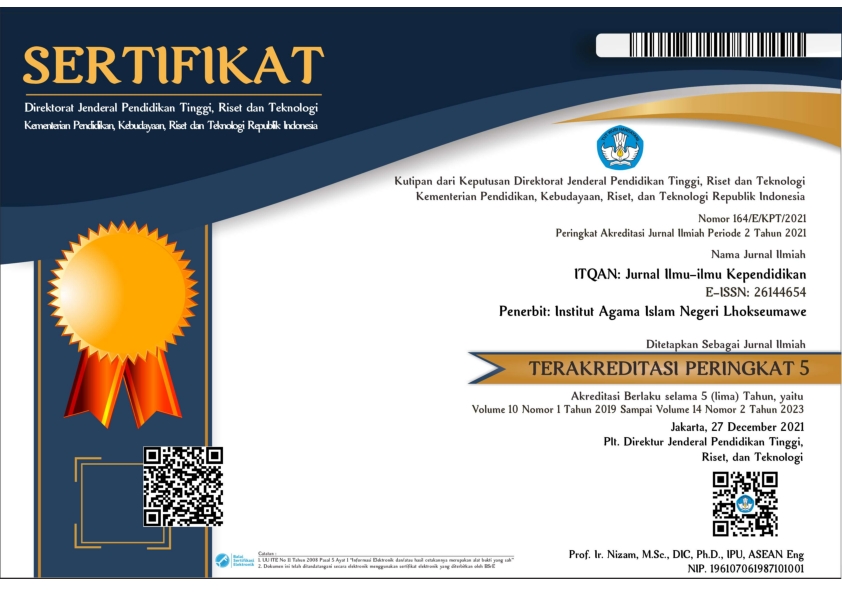Strategi Optimalisasi Hasil Akreditasi Pendidikan Pada Sekolah Menengah Pertama Swasta Darul Amin Aceh Tenggara
Main Article Content
Faizal Luqman
The purpose of this study is to see the quality of education services, where the implementation of accreditation policy is said guaranteed. From the sector of implementation, education is said to be of high quality if all the processes goes well according to the applicable standards. The purposes of this papers, researches want to know the optimization strategy used by SMPS Darul Amin in creating an excellent education services. This research is qualitative with descriptive survey technique. Sources of this information Principa himself , Deputy of curriculum, and several employees. The result of this study showed that SMPS Darul Amin achieved A for accreditation, were inseparable from essential factors, which is the forms of the system and values in the guise of superior school culture. Accreditation refers to the process being manipulated then has an instant impact. On the other side, the accreditation as a result from the process of creating school cultural result is far-reaching and long-last. Cultural establishment that makes it easier for members to adjust to the environment, work, and other member of organizations, helps in growing commitment and encouraging human resources to reach goals.
Afandi, R., & Mustajab, M. (2019). Contestation of Global Competencies: The Concepts of 3 Featured Madrasah Ibtidaiyah in Banyumas. Jurnal Pendidikan Islam, 7(2), 361–382. https://doi.org/10.14421/jpi.2018.72.361-382
Arikunto, S., Safruddin, C., & Jabar, A. (2009). Evaluasi Program Pendidikan, Pedoman Teoritis dan Praktis bagi Mahasiswa dan Praktisi Pendidikan. Jakarta: Bumi Aksara.
Arikunto, S., Suhardjono, & Supardi. (2015). Penelitian Tindakan Kelas (Edisi Revisi). Jakarta: Bumi Aksara.
BAN-SM. (2020). Draf Instrumen Akreditasi SMP/MTs 2020. Jakarta.
Botha, R. (Nico). (2007). School-Based Management: Stakeholder Participation and the Impact of Stakeholder Values. Africa Education Review, 4(1), 28–41. https://doi.org/10.1080/18146620701412126
Bungin, B. (2019). Metodologi Penelitian Kualitatif: Aktualisasi Metodologis ke arah Ragam Varian Kontemporer.
Donohoo, J. (2018). Collective Teacher Efficacy Research: Productive Patterns of Behaviour and other Positive Consequences. Journal of Educational Change, 19(3), 323–345.
Färe, R., Grosskopf, S., Forsund, F. R., Hayes, K., & Heshmati, A. (2006). Measurement of Productivity and Quality in Non‐Marketable Services. Quality Assurance in Education, 14(1), 21–36. https://doi.org/10.1108/09684880610643593
Kizlik, B. (2012). Measurement, Assessment, and Evaluation in Education. Retrieved October, 10, 2015.
Malik, Abdul, D. (2021). Pedoman Akreditasi Sekolah dan Madrasah Tahun 2021.
Moleong, L. J. (2019). Metodologi Penelitian Kualitatif.
Morest, V. S. (2009). Accountability, Accreditation, and Continuous Improvement: Building a Culture of Evidence. New Directions for Institutional Research, 2009(143), 17–27. https://doi.org/10.1002/ir.302
Mujianto, G. (2018). Sinergi Pendidikan Dan Media Masa Dalam Mencerdaskan Bangsa. Prosiding Seminar Nasional Bahasa Dan Sastra Indonesia (SENASBASA), 2(1).
Mulyasa, E. (2005). Manajemen Berbasis Sekolah: Konsep, Strategi, Implementasi (1st ed.). Bandung: Remaja Rosda Karya.
Mulyasa, E. (2013). Pengembangan dan Implementasi Kurikulum 2013. Bandung: Rosda Karya.
Nurhayati, E. (2018). Psikologi Pendidikan Inovatif (Vol. 2). Pustaka Pelajar.
OECD. (2021). Education at a Glance 2021. https://doi.org/10.1787/b35a14e5-en
OECD and Asian Development Bank. (2015). Education in Indonesia. https://doi.org/10.1787/9789264230750-en
Oktarina, N. (2007). Peranan Pendidikan Global dalam Meningkatkan Kualitas Sumber Daya Manusia. Dinamika Pendidikan Unnes, 2(3), 61996.
Redaksi, T. (2011). Undang-Undang Republik Indonesia No. 20 Tahun 2003 Tentang Sistem Pendidikan Nasional (Sisdiknas). Sinar Grafika: Jakarta.
Salabi, A. S. (2020). Efektivitas Dalam Implementasi Kurikulum Sekolah. Education Achievement: Journal of Science and Research.
Siagian, S. P. (2014). Administrasi Pembangunan: Konsep, Dimensi, dan Strateginya. Jakarta: Bumi Aksara.
Singh, A. (2020). Learning More with Every Year: School Year Productivity and International Learning Divergence. Journal of the European Economic Association, 18(4), 1770–1813.
Sunyoto, D. (2015). Penelitian Sumber Daya Manusia, Teori, Kuesioner, Alat Statistik, dan Contoh Riset. Yogyakarta: Centre of Academics Publishing Services (CAPS).
Teddlie, C., & Reynolds, D. (2000). The International Handbook of School Effectiveness Research. London: Falmer Press.
van Biljon, J., Pilkington, C., & van der Merwe, R. (2020). Cohort Supervision: Towards a Sustainable Model for Distance Learning. https://doi.org/10.1007/978-3-030-35629-3_10
Yani, A., & Prasetyo, M. A. M. (2021). Peran Majelis Permusyawaratan Ulama dalam Meningkatkan Akreditasi Pesantren di Kabupaten Bener Meriah. Idarah (Jurnal Pendidikan Dan Kependidikan), 5(1), 49–60. https://doi.org/10.47766/idarah.v5i1.1444



